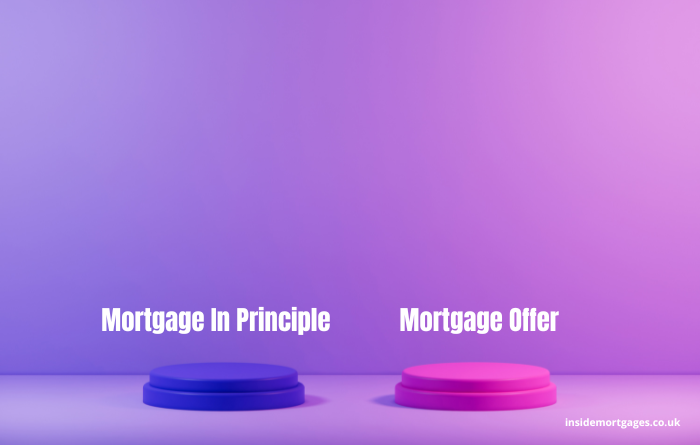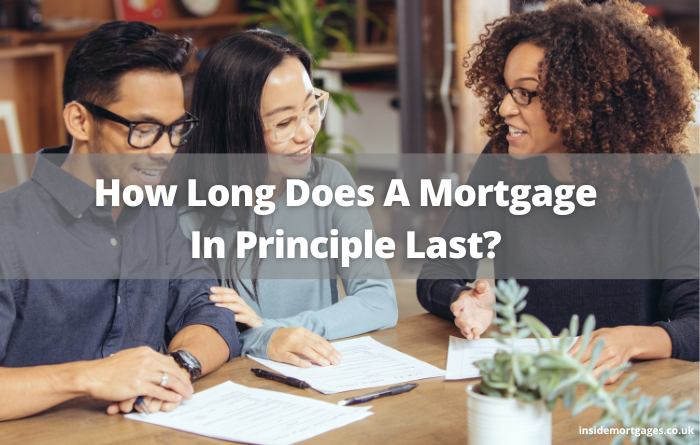How Long Does A Mortgage In Principle Last?
A Mortgage in Principle (MIP) typically lasts between 60 and 90 days, depending on the lender. The length of time can vary depending on the lender’s policies and may also be affected by changes in your financial circumstances or the property you’re interested in purchasing.
If your MIP expires before you’re able to secure a property, you may need to reapply for a new MIP. It’s important to note that a MIP is not a guarantee of a mortgage offer and lenders will need to perform a full assessment of your financial circumstances and the property before making a formal offer.
What is a Mortgage in Principle (MIP)?
A Mortgage in Principle (MIP) is a conditional mortgage approval from a lender that indicates how much they may be willing to lend you based on your financial information, credit score, and other factors. It is also sometimes referred to as a Decision in Principle (DIP) or Agreement in Principle (AIP).
The MIP is not a formal offer of a mortgage, but rather an indication of how much you may be able to borrow, subject to a more detailed assessment of your financial circumstances and the property you want to buy. The lender will still need to verify your income, employment, credit history, and other factors before finalizing the mortgage offer.
Getting a MIP can be helpful when house-hunting as it provides an estimate of the amount of money you may be able to borrow, and can give you an idea of what properties are within your budget. It can also give you an advantage when making an offer on a property as it shows that you are a serious buyer who has already been vetted by a lender.
How Long Does a MIP Last for Different Types of Mortgages
The duration of a Mortgage in Principle (MIP) can vary depending on the type of mortgage you are applying for and the lender’s policies. In general, MIPs are valid for a period of between 60 and 90 days, but this can vary depending on the lender.
For example, for a fixed-rate mortgage, a MIP may be valid for up to 90 days. However, for an adjustable-rate mortgage, the MIP may be valid for a shorter period of time, such as 60 days. Some lenders may also offer a longer MIP duration, such as 120 days.
It is important to note that the MIP is only a provisional decision, and the lender will still need to complete a full assessment of your financial circumstances and the property you want to buy before making a final mortgage offer. If your circumstances change during the MIP period, such as a change in employment or income, you may need to reapply for a new MIP.
Tips To Ensure Your Mortgage In Principle Remains Valid and Up-To-Date

Here are some tips to ensure your Mortgage in Principle (MIP) remains valid and up-to-date:
- Keep your financial information up-to-date: Your MIP is based on the financial information you provided to the lender, such as your income, credit score, and other factors. If there are any changes to your financial circumstances, such as a change in employment or income, it is important to inform the lender so that they can update your MIP accordingly.
- Don’t make any major purchases or changes: During the MIP period, it is important to avoid making any major purchases or changes to your financial situation, such as taking out new loans or credit cards, as this can affect your credit score and financial stability. It’s best to wait until after you’ve secured your mortgage to make any major financial decisions.
- Check the expiration date: MIPs typically have an expiration date, so it’s important to check the date and make sure you apply for a new MIP if necessary. Applying for a new MIP before the current one expires can help ensure that you have a continuous and up-to-date mortgage pre-approval.
- Provide accurate information: When applying for a MIP, it’s important to provide accurate and up-to-date information to the lender. This can help ensure that the MIP accurately reflects your financial situation and that you don’t run into any issues when applying for a formal mortgage offer.
- Choose the right lender: Different lenders may have different policies and requirements for MIPs, so it’s important to choose a lender that meets your needs and is transparent about their policies. Consider researching different lenders and comparing their MIP offers to find the best fit for you.
Understanding Credit Checks and Their Impact on Your MIP
Credit checks are a common part of the mortgage application process and can have an impact on your Mortgage in Principle (MIP). When you apply for a MIP, the lender will typically perform a credit check to assess your creditworthiness and financial stability.
The credit check will look at your credit score, which is a numerical representation of your creditworthiness based on your credit history. Your credit score is based on a number of factors, such as your payment history, credit utilization, length of credit history, and credit mix.
If your credit score is high, it may increase the likelihood of the lender approving your MIP and offering you favorable mortgage terms. However, if your credit score is low, it may decrease the likelihood of approval or result in less favorable terms, such as a higher interest rate or larger down payment requirement.
It’s important to note that each credit check can have a temporary negative impact on your credit score, typically by a few points. However, multiple credit checks in a short period of time can have a more significant impact on your score.
To minimize the impact of credit checks on your credit score, it’s important to only apply for a MIP from lenders that you’re seriously considering and to space out your applications over time. It’s also important to regularly monitor your credit report and dispute any errors or inaccuracies.
Who Needs A Copy Of The Mortgage In Principle?
When you receive your Mortgage in Principle (MIP) from a lender, it is generally a good idea to share it with a few different parties to help with the home-buying process. Here are some of the parties who may need a copy of your MIP:
- Estate agents: If you’re working with an estate agent to find a property, they may ask for a copy of your MIP to demonstrate that you are a serious buyer who has already been pre-approved for a mortgage.
- Sellers: When you make an offer on a property, the seller will typically want to see evidence that you have the financial means to purchase the property. Sharing your MIP can help demonstrate your financial readiness.
- Solicitors: When you’re ready to proceed with a purchase, your solicitor will need a copy of your MIP to start the legal process of buying the property.
- Mortgage brokers: If you’re working with a mortgage broker to find the best mortgage deal, they may need a copy of your MIP to help identify the most suitable lenders for your needs.
It’s important to note that while your MIP can be useful for demonstrating your financial readiness and securing a property, it is not a guarantee of a mortgage offer. Lenders will still need to perform a full assessment of your financial circumstances and the property before making a formal offer.
What to Do If Your MIP Is Refused or Rejected
If your Mortgage in Principle (MIP) is refused or rejected, it can be disappointing and frustrating. However, it’s important to understand the reasons for the refusal and take steps to address them. Here are some steps you can take if your MIP is refused or rejected:
- Ask for feedback: If your MIP is refused, ask the lender for feedback on the reasons for the refusal. This can help you understand what factors are impacting your ability to secure a mortgage offer and what steps you can take to address them.
- Check your credit report: Your credit report is one of the most important factors that lenders consider when assessing your mortgage application. If your credit score is low or you have negative marks on your report, it may be impacting your ability to secure a mortgage offer. Check your credit report for errors or inaccuracies and take steps to improve your credit score if necessary.
- Consider other lenders: If your MIP is rejected by one lender, it doesn’t necessarily mean that you won’t be able to secure a mortgage offer. Consider applying to other lenders that may have different lending criteria or requirements that better match your financial circumstances.
- Work with a mortgage broker: Mortgage brokers can help you identify the best lenders for your needs and help you navigate the application process. They can also provide guidance on how to improve your financial circumstances and increase your chances of securing a mortgage offer.
- Reapply at a later time: If you’ve been refused a MIP or a mortgage offer, it may be a good idea to wait a few months before reapplying. During this time, you can work on improving your credit score, reducing your debt-to-income ratio, or saving for a larger down payment, which can increase your chances of securing a mortgage offer in the future.
Whilst it can be frustrating having your mortgage in principle rejected isn’t the end of the world as there are plenty of practical steps that you can take steps to help ensure that a new application is more successful.
The Difference Between A Mortgage Offer And A Mortgage In Principle

A Mortgage Offer and a Mortgage in Principle (MIP) are both important steps in the process of securing a mortgage for a property purchase, but they serve different purposes.
A Mortgage in Principle is a statement from a lender that indicates how much they are willing to lend you based on an initial assessment of your financial circumstances. It is also known as a Decision in Principle or Agreement in Principle. A MIP is not a formal mortgage offer, but it can be useful when making an offer on a property as it demonstrates to estate agents and sellers that you have the financial means to purchase the property. A MIP typically lasts for 60 to 90 days, and it can be obtained relatively quickly, usually online or over the phone, without a full credit check.
A Mortgage Offer, on the other hand, is a formal offer from a lender to provide you with a mortgage loan for a specific property. To obtain a mortgage offer, you will need to provide full details of your financial circumstances, including income, expenses, debts, and assets. The lender will also conduct a full credit check and evaluate the property to ensure that it meets their lending criteria. Once you receive a mortgage offer, it will typically be valid for a period of three to six months.
Summary
If you’re purchasing a home, a Mortgage In Principle (MIP) is a statement from a lender indicating how much they are willing to lend based on a basic, initial assessment of an applicant’s financial circumstances. The offer will typically last for 60 to 90 days and can be obtained relatively quickly, usually over the phone or online.
Whilst a MIP is not a formal mortgage offer, it can be beneficial when making an offer on a property as it shows estate agents and sellers that the applicant has the necessary resources to purchase the property. Any mortgage in principle offer is subject to a full credit check and valuation of the property before an official mortgage offer is made.
If your MIP is rejected by one lender, it may not necessarily mean that you won’t be able to secure a mortgage offer, and there are steps you can take to improve your chances such as improving your credit score or working with a mortgage broker.

